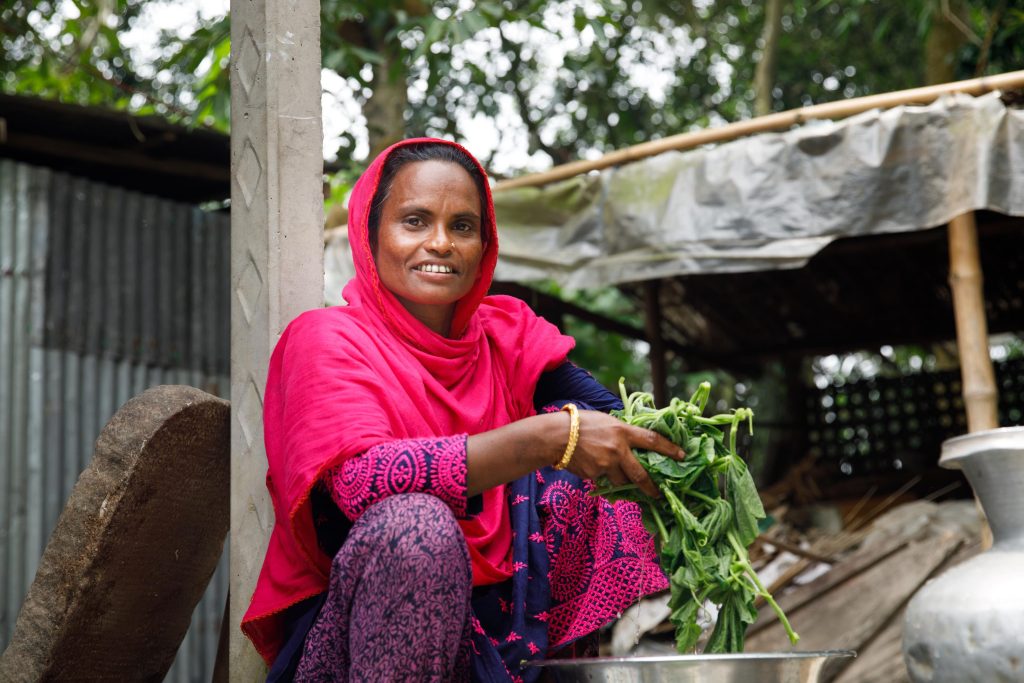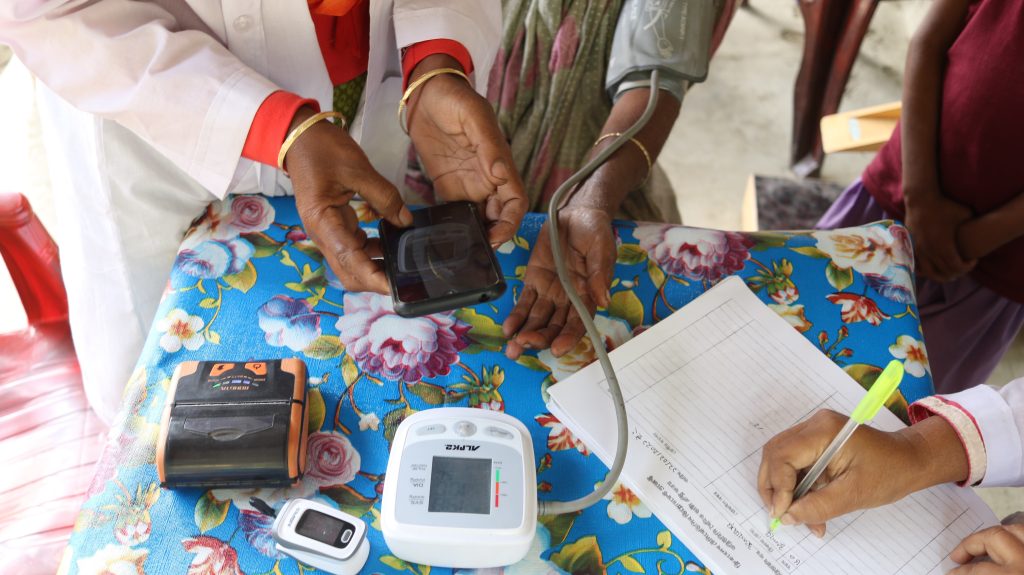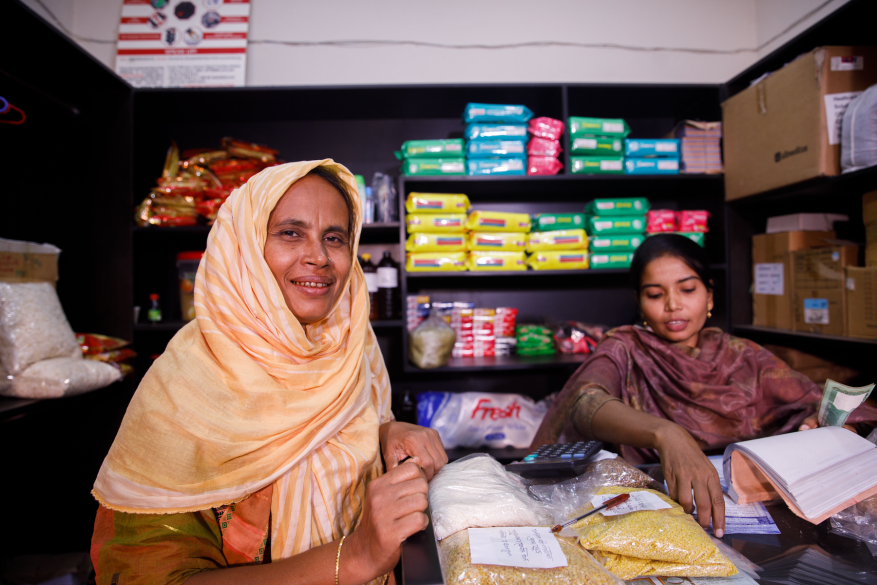Co-authored by Shamim Hossain, Sriramappa Gonchikara, Connor Steele-McCutcheon, Jaber Hassan, Leah Oatway.
The world of development is changing rapidly. As the world emerges from the COVID-19 pandemic, faces the new threats created by the Ukraine war, and grapples with the ever-increasing impacts of the climate crisis, there is increasing recognition in the Global South that new paradigms for development are needed to meet these challenges.
This is the case in Bangladesh. Although the country has made huge strides in reducing poverty during the past few decades, roughly 20 per cent of the population still live on less than $1.90 a day. A low-lying country deeply reliant on smallholder agriculture, Bangladesh is also one of the most climate vulnerable countries in the world.
As is often the case, women are among the worst affected by the climate crisis and resulting food insecurity and inequality. Women currently make up more than half of Bangladesh’s farm workers. But gender stereotypes and social and cultural norms mean they have limited access to economic resources, such as capital and skills. They also lack crucial information about market prices and climate-smart agricultural practices – stifling their ability to meet their full potential as producers and entrepreneurs.
In an effort to address this inequality and support the unique opportunities for social wellbeing enabled by rural women’s leadership and economic independence, the Women’s Business Centre has emerged as a model for organising enterprising women into cooperative business structures. Made possible with funding from organisations like the European Union, Coca-Cola, USAID, and the German development agency GIZ, these centres equip women with the means to gain control and agency over their lives. They offer a women-led social enterprise model for sustainable development that drives their own agenda for safe food, healthy living, and a sustainable planet.
This approach leverages new technology and traditional practice to build robust local economies and fair value systems in remote regions across Bangladesh that women can access and enjoy. It also ensures women have access to a safe space to learn from one another, coordinate around the causes that matter to them, and address the local and global challenges they face in terms that are contextually relevant.

Building safe spaces for collaboration and networking
Women’s livelihood groups are not a new concept, they exist around the world in various forms. But our focus on providing Bengali women entrepreneurs who have businesses and visions for growth with the training, products and services they need to thrive sets our centres apart and has driven their success in recent years.
Having started with a pilot of 10 women’s business centres across the country, seven years later there are more than 450, reaching approximately 450,000 women producers across more than 10 districts and serving a population of approximately 2.5 million people in remote and under-resourced communities in Bangladesh.
These entrepreneurs work across a range of value chains, including local poultry, organic vegetables, sustainable fisheries, traditional handicrafts, innovative IT and digital services, holistic healthcare and wellbeing products, green energy solutions, transport and aggregation services.
Depending on their needs, skills and visions, women have gained access to agro ecological supplies and training; seasonal agro ecological products; information and communication technology services; nutrition promotion and monitoring; behaviour change communication and support to access digital health services.
Together, the women’s business centres are now building strong customer relationships and markets. They are improving the quality of products rural women produce by promoting traditional and innovative practices, ensuring regular supply and fair wages for producers, improving price points for local products and building product traceability.
And it’s not just about business growth. During the COVID-19 pandemic, the centres became crucial sources of information about the virus as well as places where people could buy masks and soap made by local businesswomen amid shrinking global supply chains. Telemedicine apps introduced to increase rural women’s access to healthcare were also rolled out through these centres, with extra support to use them provided where literacy was proving a barrier to uptake.
Our business centres provide a safe place for rural women to gather, learn and collaborate – creating vibrant, self-sustaining and transformative local movements. And the benefits to the local community and the centres’ members run both ways. The more producers engage with their local women’s business centres to sell their products, the greater the customer base for other producers and entrepreneurs.
The centres recruit new members through social marketing outreach, skills training, and savings programmes to build local investment capital and act as an incubator for women looking to start or expand their businesses.

Building on success in Bangladesh and beyond
To build on these successes, we recently created the Nari Jhuri “Women’s Basket” Social Enterprise Network. It enables access to new forms of capital – including impact investment, revenue from product sales and service delivery – with the collective purchasing power of thousands of women entrepreneurs. It is also a key component of creating a recognisable WBC brand in Bangladesh that is linked to the agroecological practice and rural women’s leadership that has been at the core of each centre. The Network positions rural women entrepreneurs as frontline climate warriors to combat the challenges of climate change in Bangladesh.
The network is part of our innovative approach to creating community-driven development towards the UN’s Sustainable Development Goals in rural Bangladesh in ways that are contextually relevant and self-funding. Within the Network, centres that have already achieved self-funded growth will work as mentors for women entrepreneurs keen to adopt this model.
Beyond Bangladesh, we also see enormous potential to replicate this model and build on the learnings and vision of our women entrepreneur partners. In the coming year we will be piloting the roll out of the women’s business centre model in Kenya, Malawi and Nigeria with their structures, products and service offerings varying widely based on market demand and the leadership of women entrepreneurs. From access to health care and preventative health information to savings and loans groups, WBCs will use digital tools and social marketing to bring an enterprise-based approach to a wide range of multi-sectoral programming.
In Kenya, Self Help Africa currently supports a dairy project that involves working with cooperatives to strengthen supply chains for quality milk by increasing the nutritional intake of the animals. Through women’s business centres we hope to build on this success, creating local demand through digital nutrition promotion that benefits rural women farmers and the nutrition of their local community.
In Nigeria and Malawi, meanwhile, our focus will be on health and wellbeing promotion, linking the social marketing of health and WASH products and practices to digital health services that support women’s wellbeing and existing health systems.
The COVID-19 pandemic and the war in Ukraine have served as stark reminders of the fragility of the global supply chain and underscored the need for resilient local economies that can protect themselves from price volatility and the availability of commercial import and export markets.
The continued success of these centres demonstrates the importance of resilient local circular economies as a platform for community development.
You can learn more by visiting www.womensbusinesscentres.org.

